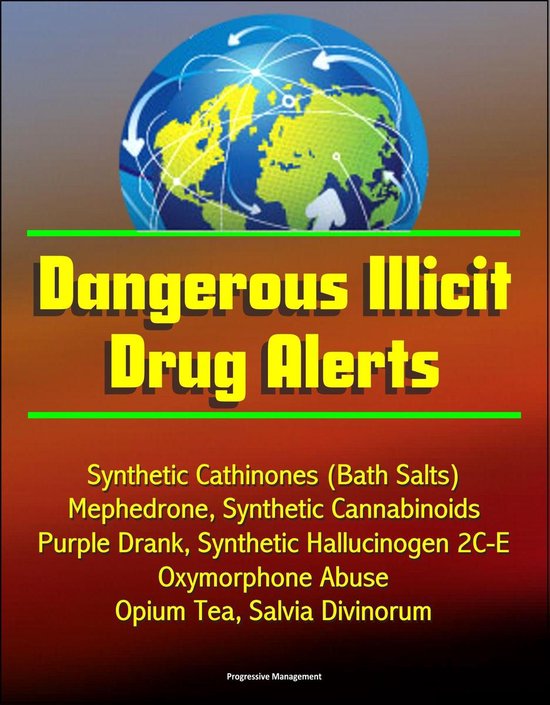
Dangerous Illicit Drug Alerts: Synthetic Cathinones (Bath Salts), Mephedrone, Synthetic Cannabinoids, Purple Drank, Synthetic Hallucinogen 2C-E, Oxymorphone Abuse, Opium Tea, Salvia Divinorum
The National Drug Intelligence Center (NDIC) has prepared these important dangerous drug alerts about unique and serious threats: Synthetic Cathinones (Bath Salts), Mephedrone, Synthetic Cannabinoids, Purple Drank, Synthetic Hallucinogen 2C-E, Oxymorphone Abuse, Opium Tea, Salvia Divinorum.
Synthetic cathinones, typically marketed as "bath salts" and "plant food," are sold legally under various names (Ivory Wave, Blizzard, etc.) in most areas of the United States. The products are generally sold in retail establishments such as adult stores, independently owned convenience stores, gas stations, head shops, and skateboard shops. The products, as well as their raw chemical components, are also sold on many Internet sites, including popular Internet auction sites. Additionally, synthetic cathinones have been sold by independent dealers as ecstasy a—in powdered form, in single-component tablets and capsules, and in tablets and capsules containing cathinones combined with MDMA (3,4-methylenedioxymethamphetamine) or other illicit controlled substances. Abusers typically ingest, inhale, inject, smoke, or snort (insufflate) the drugs to experience stimulant effects similar to those induced by amphetamine.
Manufacturers and distributors of synthetic cathinone products evade U.S. Drug Enforcement Administration (DEA) regulation and enforcement because synthetic cathinones are not scheduled under the Federal Controlled Substances Act (CSA). However, possession and distribution of the synthetic cathinones may be prosecuted, albeit with greater difficulty, under the Federal Controlled Substance Analogue Enforcement Act of 1986 (as amended)b of the CSA. The availability and suitability of a prosecution under the analogue statute depends on the particular compound being trafficked and the facts of the case. Further, distributors deceptively market synthetic cathinone products as "not for human consumption" to evade U.S. Food and Drug Administration (FDA) scrutiny. Cathinone products that are introduced into interstate commerce and promoted as alternatives to illicit street drugs may be prosecutable under the Federal Food, Drug, and Cosmetic Act as unapproved new drugs and misbranded drugs. (See the offenses at 21 U.S.C. 331(a), (d) and penalties at 21 U.S.C. 333.)1 Additionally, members of the Congress have introduced legislation to nationally ban the sale of certain synthetic cathinones, c and, as of April 2011, all 50 states and the District of Columbia have introduced or announced plans to introduce legislation banning or restricting the distribution and possession of certain synthetic cathinones and cathinone derivatives. As synthetic cathinones become more regulated, abusers will likely use the Internet with greater frequency to purchase cathinone products, the raw chemicals used in their production, and products that contain cathinones not specifically prohibited by enacted legislation.
The illicit trafficking and abuse of drugs present a challenging, dynamic threat to the United States. Overall demand is rising, largely supplied by illicit drugs smuggled to U.S. markets by major transnational criminal organizations (TCOs). Changing conditions continue to alter patterns in drug production, trafficking, and abuse. Traffickers are responding to government counterdrug efforts by modifying their interrelationships, altering drug production levels, and adjusting their trafficking routes and methods. Major Mexican-based TCOs continue to solidify their dominance over the wholesale illicit drug trade as they control the movement of most of the foreign-produced drug supply across the U.S. Southwest Border.
| Auteur | | Progressive Management |
| Taal | | Engels |
| Type | | E-book |
| Categorie | | Biografieën & Waargebeurd |





